At Umbra we very much value learning through experience and community. For this reason, Umbra offers students a wide range of volunteering and community engagement opportunities that not only enhance the quality of their abroad time, but also contribute to the community they’re actively living in. Among the many, Solidarity Purchasing volunteering is one of the activities offered at Umbra thanks to Fuori di Zucca, a local Solidarity Purchasing Group we’re extremely happy to collaborate with.
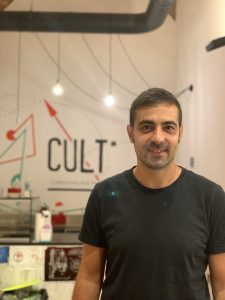 Fuori di Zucca is a Solidarity Purchasing Group born in 2015 in Perugia: “We were only 5 people at the beginning. We are now 100 associates and 12 local producers”, says Domenico Lizzi, founder and current President of the Association. You might be wondering, at this point, what a Solidarity Purchasing Group is. We didn’t have it clear at the beginning either, but Domenico helped us understanding. “A Solidarity Purchase Group is aimed at purchasing goods (in this case, agri-food goods) from local and small producers who are respectful of the environment and the people involved in the production chain, and then at selling them at the group’s associates”. Of course, the involved producers are not chosen randomly: “Back in 2016, we started defining the ethical and environmental standards we wanted our producers to respect. Every time we get in touch with a new or potentially new producer, we visit their production site and establish a deep trustful relationship to make sure these standards are respected”, explains Domenico. Even without complex and expensive quality labels, it is reciprocated trust and well-oiled internal control that guarantees both ethical and agricultural quality.
Fuori di Zucca is a Solidarity Purchasing Group born in 2015 in Perugia: “We were only 5 people at the beginning. We are now 100 associates and 12 local producers”, says Domenico Lizzi, founder and current President of the Association. You might be wondering, at this point, what a Solidarity Purchasing Group is. We didn’t have it clear at the beginning either, but Domenico helped us understanding. “A Solidarity Purchase Group is aimed at purchasing goods (in this case, agri-food goods) from local and small producers who are respectful of the environment and the people involved in the production chain, and then at selling them at the group’s associates”. Of course, the involved producers are not chosen randomly: “Back in 2016, we started defining the ethical and environmental standards we wanted our producers to respect. Every time we get in touch with a new or potentially new producer, we visit their production site and establish a deep trustful relationship to make sure these standards are respected”, explains Domenico. Even without complex and expensive quality labels, it is reciprocated trust and well-oiled internal control that guarantees both ethical and agricultural quality.
“The most important message we want to convey to people is that if we, as a community, get organized, we can all eat high quality products at a price that is affordable for everyone, and fair for the producers”. In fact, Fuori di Zucca’s associates (and, hence, “clients”) are all kinds of people: students, middle class families, single workers, the elderly, and also disadvantaged people. In this regard, the association also provides groceries to five families in need. “It is undoubtful that the ethical basis of our Association is a core part of what we do. At the same time, this project couldn’t be economically sustainable and competitive with the great distribution chains if we couldn’t rely on the actual quality of the products we sell”. Quality and fresh food products ore, in the end, the reason why Fuori di Zucca is so successful and widely participated.
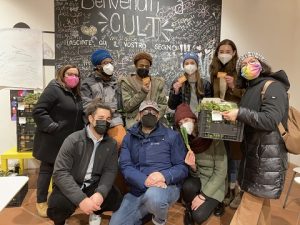 Last year, Umbra Students had the chance to learn how such a project works and to be part of it. “It was a pleasure to have them here, as well as a great help for us”. Students managed to overcome linguistic barriers and to discover the actual purpose of the initiative, also choosing to buy their groceries at the weekly Fuori Di Zucca distribution market. “A positive and healthy approach to food is, luckily, widely spreading at the moment, of course also in the US. At the same time, many of the Umbra students had never actually experienced a similar project. I really hope this experience gave them something to bring back home.” This semester’s volunteering session is about to start, and any feedback or suggestions from Umbra’s students on what Fuori di Zucca is doing will be more than encouraged and welcome. See you all there soon!
Last year, Umbra Students had the chance to learn how such a project works and to be part of it. “It was a pleasure to have them here, as well as a great help for us”. Students managed to overcome linguistic barriers and to discover the actual purpose of the initiative, also choosing to buy their groceries at the weekly Fuori Di Zucca distribution market. “A positive and healthy approach to food is, luckily, widely spreading at the moment, of course also in the US. At the same time, many of the Umbra students had never actually experienced a similar project. I really hope this experience gave them something to bring back home.” This semester’s volunteering session is about to start, and any feedback or suggestions from Umbra’s students on what Fuori di Zucca is doing will be more than encouraged and welcome. See you all there soon!
Debora Del Cogliano for The Umbra Institute
Domenico Lizzi for Fuori di Zucca


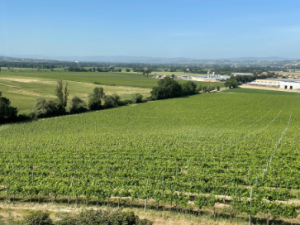
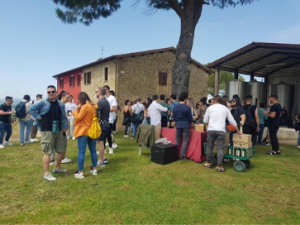 Another of my favorite experiences was participating in a multiple day bottling
Another of my favorite experiences was participating in a multiple day bottling 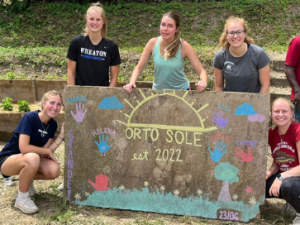 The beginning of the summer was mostly spent on physical projects, turning the overgrown, terraced plot of land into a functioning garden. A typical workday started at 9am with the fundamentals of gardening: weeding and watering. This year we attempted many annual crops throughout several different garden beds, so we were constantly battling the weeds that crept through our mulch. In June, most of my projects were physical – we’d spend several days fixing wooden stairs throughout the garden, clearing new raised beds for next summer, staking and pruning tomato plants, and clearing bushes from the archways located at the top of our garden. One archway is large enough to become an outdoor classroom, so we worked to clear the overgrown bushes from its entrance, flatten the ground, remove large pieces of trash, and plan for this new didactic space.
The beginning of the summer was mostly spent on physical projects, turning the overgrown, terraced plot of land into a functioning garden. A typical workday started at 9am with the fundamentals of gardening: weeding and watering. This year we attempted many annual crops throughout several different garden beds, so we were constantly battling the weeds that crept through our mulch. In June, most of my projects were physical – we’d spend several days fixing wooden stairs throughout the garden, clearing new raised beds for next summer, staking and pruning tomato plants, and clearing bushes from the archways located at the top of our garden. One archway is large enough to become an outdoor classroom, so we worked to clear the overgrown bushes from its entrance, flatten the ground, remove large pieces of trash, and plan for this new didactic space.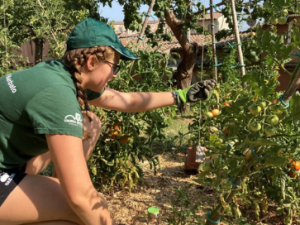
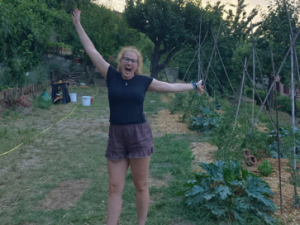 ON WHY ORTO SOLE MATTERS
ON WHY ORTO SOLE MATTERS 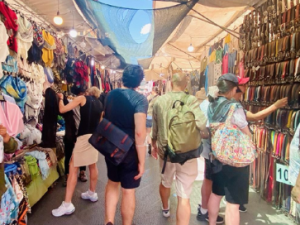 The Chicago School students and their professor PhD Rocco Catrone had some nice adventures exploring Italy and the community-immersive learning experience The Umbra Institute so much stands (and works) for. This Summer Session 2 Semester at Umbra was, in fact, blessed with the company of many faculty-led groups visiting us.
The Chicago School students and their professor PhD Rocco Catrone had some nice adventures exploring Italy and the community-immersive learning experience The Umbra Institute so much stands (and works) for. This Summer Session 2 Semester at Umbra was, in fact, blessed with the company of many faculty-led groups visiting us.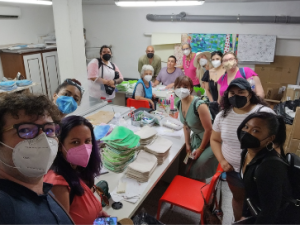
 Since 1971, all contraceptive methods have been fully legal in Italy. Over-the-counter contraceptive methods can be easily obtained at any pharmacy and store (such as male and female condoms), while
Since 1971, all contraceptive methods have been fully legal in Italy. Over-the-counter contraceptive methods can be easily obtained at any pharmacy and store (such as male and female condoms), while 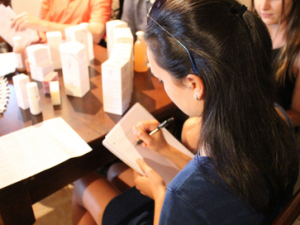 Do you want to consult specific resources and research about Reproductive Health in Italy? Try to check out these materials:
Do you want to consult specific resources and research about Reproductive Health in Italy? Try to check out these materials: 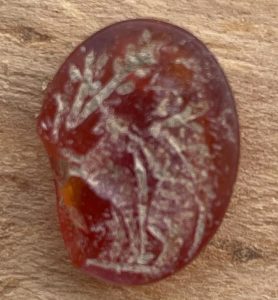
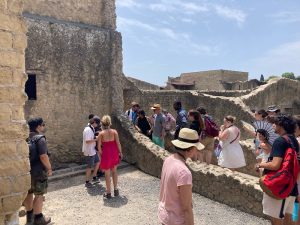 Being in Italy gives Field School participants plenty of hands-on experiences. This is true even beyond the dig site as while students take
Being in Italy gives Field School participants plenty of hands-on experiences. This is true even beyond the dig site as while students take 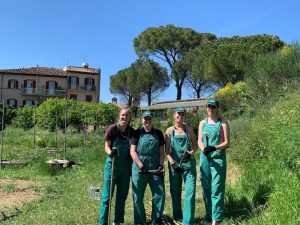 The Umbra Institute offers a competitive and fully hands-on
The Umbra Institute offers a competitive and fully hands-on 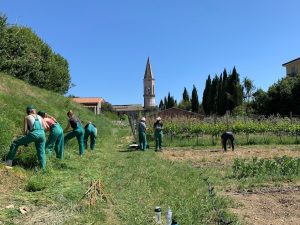 During the whole month of June, the Umbra Institute’s interns went twice a week to a fifteenth-century monastic compound just down the hill from Perugia’s historic center. The complex, begun around 1000 C.E., was the site of Perugia’s first agricultural school and more recently became the headquarters of the University of Perugia’s School of Agriculture. Eight years ago professors and students in the Ag School started the Green Team, a group of volunteers who built a two-acre community garden inside the monastery complex’s walls. In addition to professors and Ag students, members of the surrounding Borgo XX Giugno neighborhood joined in the work of planting, weeding, and watering twice a week. Among the objectives of a community garden is producing healthy food, but another much more important goal for most urban gardens is producing community.
During the whole month of June, the Umbra Institute’s interns went twice a week to a fifteenth-century monastic compound just down the hill from Perugia’s historic center. The complex, begun around 1000 C.E., was the site of Perugia’s first agricultural school and more recently became the headquarters of the University of Perugia’s School of Agriculture. Eight years ago professors and students in the Ag School started the Green Team, a group of volunteers who built a two-acre community garden inside the monastery complex’s walls. In addition to professors and Ag students, members of the surrounding Borgo XX Giugno neighborhood joined in the work of planting, weeding, and watering twice a week. Among the objectives of a community garden is producing healthy food, but another much more important goal for most urban gardens is producing community. 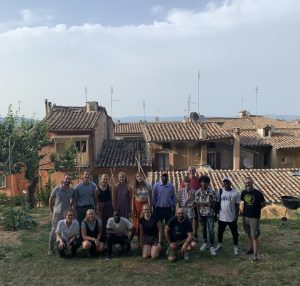 It was in this spirit that Professor David Grohmann and his colleagues of the Green Team invited Umbra’s Orto Sole interns to join them each Wednesday and Friday in the garden at San Pietro. Umbra’s students have worked beside their Italian peers, together with the older residents of the neighborhood; as they water the plants there, they soak in ideas about how to further develop Orto Sole and its “organic” connections to the surrounding neighborhood.
It was in this spirit that Professor David Grohmann and his colleagues of the Green Team invited Umbra’s Orto Sole interns to join them each Wednesday and Friday in the garden at San Pietro. Umbra’s students have worked beside their Italian peers, together with the older residents of the neighborhood; as they water the plants there, they soak in ideas about how to further develop Orto Sole and its “organic” connections to the surrounding neighborhood.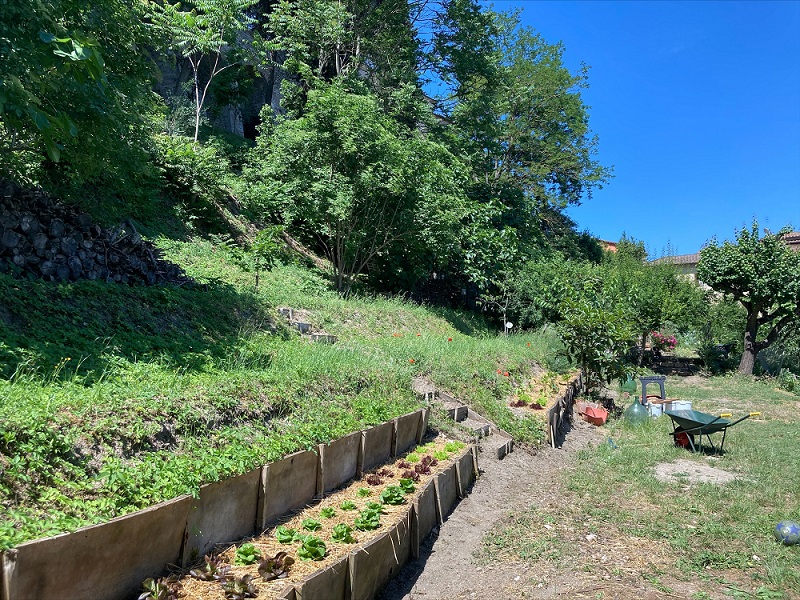
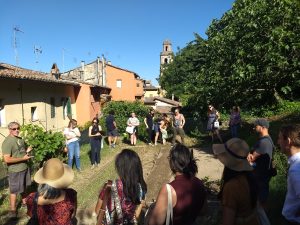 People, food, and agricultural products are in constant movement, affecting landscapes, material practices, and cultural representations. This fifth Food & Sustainability Studies Conference aimed to examine the effects of these movements on local, regional, national, and international communities, and how the Covid pandemic has altered (or shaped) these movements. In particular, the conference sought to understand continuities/discontinuities in current and past long-distance food exchanges, the relationships between “authentic” and diasporic foodways, the forced movement of agricultural workers and their crops in the face of climate change and a global pandemic, and the impact of economic and social disparities on current and future food movements. By posing these questions, the conference offered a wide range of perspectives that contemplated intersections between the Food Studies realm and other fields, such as education, activism and social movements, identity politics, literature, migration studies, geography, hospitality, and environmental studies.
People, food, and agricultural products are in constant movement, affecting landscapes, material practices, and cultural representations. This fifth Food & Sustainability Studies Conference aimed to examine the effects of these movements on local, regional, national, and international communities, and how the Covid pandemic has altered (or shaped) these movements. In particular, the conference sought to understand continuities/discontinuities in current and past long-distance food exchanges, the relationships between “authentic” and diasporic foodways, the forced movement of agricultural workers and their crops in the face of climate change and a global pandemic, and the impact of economic and social disparities on current and future food movements. By posing these questions, the conference offered a wide range of perspectives that contemplated intersections between the Food Studies realm and other fields, such as education, activism and social movements, identity politics, literature, migration studies, geography, hospitality, and environmental studies.